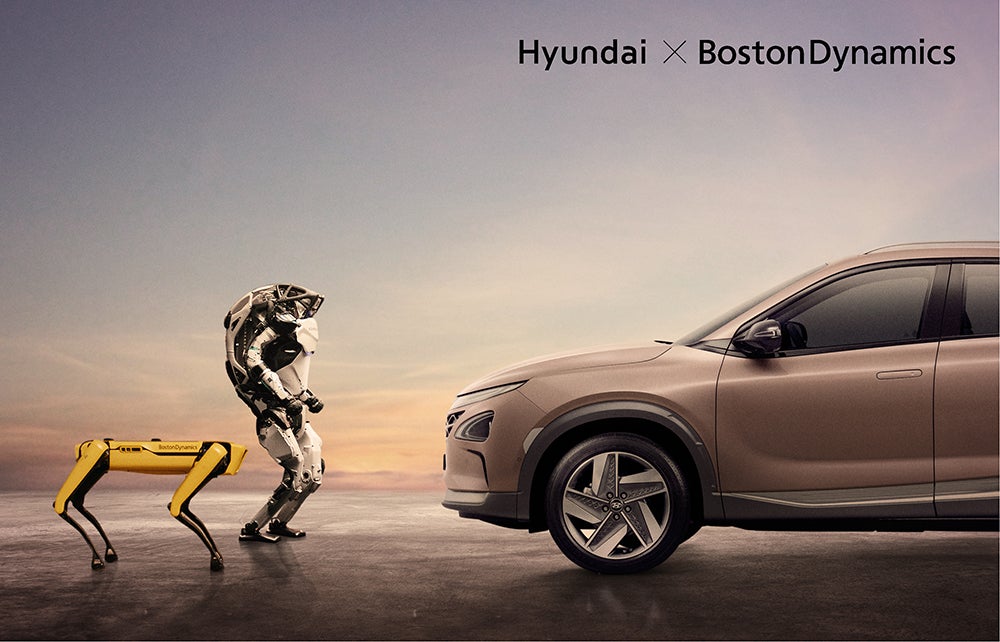
Robot developer Boston Dynamics has been bought by car maker Hyundai as more machines take over jobs from workers. The South Korean automaker now owns 80% of the $1.1bn tech firm whereas old owner SoftBank, which bought Boston Dynamics from Alphabet in 2017, retains a 20% stake in the company.
Most people probably know Boston Dynamics from its long string of promotional videos showcasing its range of robots doing everything from rocking out to The Contours hit Do You Love Me to attempting parkour moves. Dancing YouTube videos aside, Boston Dynamics has also carved out a slice for itself in the growing robotics market.

Access deeper industry intelligence
Experience unmatched clarity with a single platform that combines unique data, AI, and human expertise.
In June 2020, it started to sell its dogbot Spot for commercial use. Its robots now operate in industries including power utilities, construction, manufacturing, oil and gas and mining
Boston Dynamics and Hyundai announced the deal at the end of 2020, but it has now been completed following regulatory approval.
So why is Hyundai buying a robotics company first spun out from Massachusetts Institute of Technology in 1992?
Looking at the official press release, which is lauded by corporate business technobabble, it seems as if the acquisition is part of Hyundai’s strategy to become “a smart mobility solution provider.” This push seemingly includes investing in everything from autonomous driving, smart factories, artificial intelligence (AI), collaborating with Uber to develop flying cars, and – yes – robots.

US Tariffs are shifting - will you react or anticipate?
Don’t let policy changes catch you off guard. Stay proactive with real-time data and expert analysis.
By GlobalDataHyundai claims these initiatives and the acquisition of Boston Dynamics will enable it “to develop advanced technologies that enhance people’s lives and promote safety, thereby realizing progress for humanity.”
In a promotional video published at the completion of the Boston Dynamics deal, Hyundai seemingly suggested that “progress for humanity” could mean having robots dressed as nurses, seeing-eye robo-dogs, people with exoskeletons and robots dancing with humans.
Of course, it would be easy to scoff and say, like Vice does in this article, that “Hyundai envisions a lonely future in which social cohesion between humans has broken down and robots are our only friends.”
However, that would be missing the point. The fact is that robots are already providing many important services and often in a safer and more secure ways than humans. More importantly, they are providing services where there aren’t enough workers available.
That is the case in the care sector, which has already become a vibrant segment of the robotics market, as highlighted in recent thematic research from GlobalData. In places like Japan where there is a shortage of skilled workers, robots provide care and support for the elderly and the disabled.
“According to the WHO, the proportion of elderly people (aged 60 and over) will increase from 12% in 2015 to 22% in 2050,” GlobalData analyst Nicklas Nilsson recently told Verdict. “Smart robots that can hold simple conversations and learn people’s interests have been deployed in some UK care homes after an international trial found they boosted mental health and reduced loneliness.”
Hyundai wouldn’t be the only car manufacturer launching care robots: both Toyota and Honda have been developing care robots for many years.
That being said, it would be impertinent to ignore how robots could end up taking jobs away from humans. This is already the case in factories and in warehouses. Soon, it could also be the story in other sectors.
Food-delivery companies like Uber and Deliveroo are also expected to solve some of their issues with gig economy workers in the future by swapping them for flying drones or ground-based delivery robots. Several companies in that sector already innovate to make that a reality.
“If you are a pure labour-based solution you have a fundamental blocker on your unit economics: you have to pay minimum wage, and hopefully more, to the individual that’s riding a bike or walking down the road,” Alistair Westgarth, CEO of robot company Starship Technologies, recently told Verdict, arguing that robots represent a fixed price as they won’t need to be tipped or paid an hourly rate.






